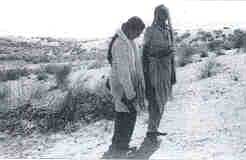At rainbow`s end
 Indira Gandhi Canal Project has come to my desert land They say it will bring greenery all over Oh! the sisters have come Yes, the sisters have come The rich got land deeds to command (irrigated) land The poor souls all reached atop the sand dunes . Oh! the sisters have come Yes, the sisters have come
Indira Gandhi Canal Project has come to my desert land They say it will bring greenery all over Oh! the sisters have come Yes, the sisters have come The rich got land deeds to command (irrigated) land The poor souls all reached atop the sand dunes . Oh! the sisters have come Yes, the sisters have come
IN THE documentary Sona Matti, director Sehjo Singh documents a rural woman's (Sonabai) struggle for land. When Dhukmera station in Rajasthan reaped the benefits of irrigation 18 years ago, the v:st barren tracts owned by lower castes suddenly became prized property. All traditional land-holdings were cancelled, and a new dispensation took place which obviously favoured the upper castes.
As the hapless people turned to alternative occupations in local stone mines, they fell victims to tuberculosis and silicosis which only worsened their condition. In a moving sequence, the film records the death of Sonabai's brother-in-law, where she bursts out, laugh at God; is this a joke?"
To help the landless women, the Urmul Trust stepped forward and formed a mahila mandal. It helped the women to unite on issues like health and loan of seeds. Sonabai soon emerged a leader among the women and largely through her pioneering efforts, the women began to educate themselves about the legal implications of their situation and possible means of redressal.
The film traces the trauma of redrawn maps, reallotted land, unintelligible government notices, unfair sharing of water for irrigation and endless bureaucratic procedures.
In the telisildars office, after being given a bewildering list of instructions of what she must do to retrieve her land, Sonabai is told by a rich man awaiting his turn, "I could have explained this to you-, now let me ask..."
But nothing would deter the lady-in-arms. As Sonabai puts it, "I may be illiterate, but my brain is sharper than a literate person's... " She has little respect for those in power, and spews venom: "It's people who make the government, but people are not heard." In her opinion, once in power, one does not pay heed to underdogs.
Spitting fire and brimstone, she raises an accusing finger at the block development officer: "You steal our quotas. Sitting here, fattening up. Stealing our loans for making homes, this village officer. I won't let you take other's rights and won't let you take mine."
An indefatigable community worker, She scolds a woman for not returning her seed loan, counsels another to not let her illness overcome her, organises a play and enacts the role of the tehsildar, and prompts the women into formulating their arguments. At the end, the group sings a song in her honour. The film employs title cards to explain village politics and redefine certain local terms, aptly.
